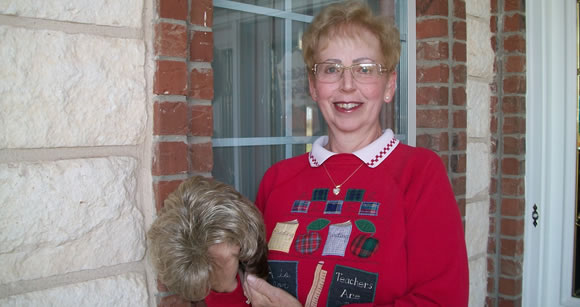
Not without a cost, though.
Both women are survivors of breast cancer, a life threatening disease that permanently transformed their outlooks on life.
“Surviving breast cancer makes you appreciate life a whole lot more,” Archuleta said. “It makes you realize how mortal you really are, and you realize what’s really important in your life.”
It all started with suspicious lumps in their breasts.
“When I noticed a lump in my breast, I didn’t think too much of it and scheduled a mammogram,” Archuleta said. “Then I noticed it was growing, and I felt like something was wrong.”
Archuleta and Schaefer both were diagnosed with breast cancer in their mid-fifties.
“When I was diagnosed, I thought ‘I don’t want to die’,” Schaefer said. “Then I instantly thought ‘what can we do to stop it’?”
The answer to her question? Chemotherapy.
“After receiving a treatment, I would feel like I had the flu for weeks on end,” Schaefer said. “Just when I would start to feel better, they would give me another treatment. I had never really been sick before that, so it was a rude awakening.”
Archuleta received two different kinds of chemotherapy.
“I got really sick in between treatments because chemotherapy uses poison to kill the bad stuff as well as the good stuff,” she said. “I developed Neutropenic fever and had to stay in the hospital for days. But I knew if they didn’t kill the bad stuff, it was going to kill me.”
Schaefer said the side effects of the treatments were devastating.
“When I lost my hair, I was completely shattered because it was a huge part of me and then it was gone,” she said. “I started to rationalize with myself and wonder if my hair made me who I was. I also got infections under my nails, and lost three fingernails and two toenails.”
Unfortunately, a mere wig could not completely solve the women’s hair loss problem.
“I lost all of my hair, including my eyebrows, eyelashes, arm hair, everything,” Archuleta said. “There was no hair anywhere on my body. I didn’t have to shave my legs for six months, which was nice actually.”
Even though these side effects were drastic, both women still maintained optimistic attitudes.
“There are actually advantages to being bald,” Schaefer said. “It takes you less time to get ready when you don’t have do your hair or put on mascara. Just slap a hat on your head and do your thing.”
Archuleta even found a way to make her great nephew, Nathan, accept her bald condition.
“When I started losing my hair, we had a hair shaving party,” she said. “Nathan and I played games with wigs and scarves so that he would never be afraid of me. It worked.”
But as much as they tried to laugh things off, difficult times hit the women as well.
“The hardest part was having to wait,” Archuleta said. “Wait for them to find out what kind of treatment, when to start treatment, and most importantly, your results. That was very frustrating to me.”
Schaefer felt confusion as to why she developed the breast cancer.
“I was a person who watched my weight, exercised regularly and I never smoked,” she said. “I tried to eat healthy and I still came up with cancer. Cancer doesn’t care about color, age or economic situation. It can get anyone.”
Which is the exact reason why having a yearly mammogram is so essential for all women.
“One year there was nothing wrong with me, and in 12 months the cancer had already formed and was spreading,” Schaefer said. “If I hadn’t of gotten my mammogram, it would’ve spread to other places. I believe it saved my life.”
Longtime Clarendon College Board of Regents member Doug Lowe, who lost his wife in 2008 to ovarian cancer, knows the severity of cancer and encourages women to receive their yearly exams.
“Some people don’t want to know if they have cancer, but they should,” Lowe said. “They shouldn’t be afraid. Early diagnosis is the key. With any kind of cancer, the earlier you get it diagnosed, the easier it will be to get treated.”
Thankfully for Archuleta and Schaefer, their cancers were caught, treated, and eliminated. Both believe that surviving breast cancer has made them stronger.
“If you live through the possibility of dying, it makes you stronger,” Schaefer said. “You learn to not take life for granted, and the loved ones around you become even more precious. You know that you can either sit there and cry about it, or laugh through it. And you make it, one day at a time.”
*******
Please join the Clarendon High School Student Council in supporting the Breast Cancer Awareness Foundation by wearing a “Think Pink” T-shirts on Pink Out Day, which is October 12.
The money from each “Think Pink” shirt sold by student council members will be donated to the Breast Cancer Awareness Foundation.


Leave a Reply
You must be logged in to post a comment.